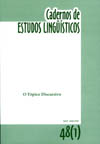Resumen
This study focuses on the management of the discursive topic in sequences of comic strips and it is inscribed within the research area dedicated to the continuum oral/written. Taking a functionalist perspective, in special that of Textual Linguistics, the study considers the topic not a simple, discrete function, but a complex functional domain, a scaling notion that characterizes itself by the properties of central concern and relevance. Supported by research models of oral texts, mainly Koch et al. (1992), one sequence of comic strips produced by a Brazilian author is analyzed in a research type both qualitative and interpretative. The textual organization is detected in observing both linear and hierarchical levels, identifying topic introduction, maintenance and change strategies. The study shows that thematic continuity is guaranteed by the combination of linguistic and visual elements and is made by similar strategies used in both oral and written texts, in addition to those specific of comic sequences.Citas
BROWN, G. e YULE, G. (1983). Discourse analysis. Cambridge: University Press.
CROW, B. K. (1983). Topic shifts in couples conversations. In: CRAIG, R. T. e TRACY, K. Conversational coherence. California: Sage Publications.
DASCAL, M. e KATRIEL, T. (1979). Digressions: a study in conversational coherence. In: PETÖFI, J. S. (org.). Text vs sentence. Hamburgo: Buske. pp,76-95.
DIJK, T. van. (1996). Cognição, discurso e interação. (org. Ingedore Koch). São Paulo, Contexto. FÁVERO, L. L. (1999). O tópico discursivo. In: PRETI, D. (org.) Análise de textos orais. 4ed. São Paulo: Humanitas.
FÁVERO, L. L. et al. (2002). Oralidade e escrita: perspectivas para o ensino de língua materna. 3ed. São Paulo: Cortez.
GOFFMAN,E. (1986). Frame analysis. Boston: Northeastern Univ. Press.
GOUTSOS, D. (1996). Modelling discourse topic: sequential relations and strategies in expository text. Norwood, New Jersey: Ablex Publishing Corporation.
KOCH, I. V. (1992). Organização tópica da conversação. In: KOCH, I. V. A inter-ação pela linguagem. São Paulo: Contexto. pp. 71-115.
KOCH, I. V. et al. (1992). Organização tópica da conversação. In: ILARI, R. (org.) Gramática do Português falado. Campinas: UNICAMP. v.2. pp. 359-447.
KOCH, I. V. et al. (1991). Aspectos do fluxo de informação no discurso oral dialogado. In: CASTILHO, Ataliba T. (org.) Gramática do português falado. 2ed. Campinas: UNICAMP/FAPESP.
KOCH, I. V. (2000). Coerência e manutenção temática no hipertexto. ABRALIN.
LINS, M. da P. P. (2004). Organização tópica do discurso de tiras de quadrinhos. Tese de Doutorado. Rio de Janeiro: UFRJ.
MARCUSCHI, L. A. (2001). Letramento e oralidade no contexto das práticas sociais e eventos comunicativos. In; SIGNORINI, Inês. (org.) Investigando a relação oral/escrito. Campinas: Mercado de Letras.
MONDADA, L. (2001). Gestion du topic et organization de la conversation. Cadernos de estudos lingüísticos. Campinas. nº 41. Jul/Dez. pp. 7-36.
PAREDES SILVA, V. L. (1995). Ao correr da pena. In: HEYE, J. (org.) Flores verbais. Rio de Janeiro: Ed 34.
QUELLA-GUYOT, D. (1990). A história em quadrinhos. (trad. Maria Stela Gonçalves e Adail Ubirajara Sobra). São Paulo: Unimarco/ Loyola.
TANNEN, D. (1985). Relative focus on involvement in oral and written discourse. In: OLSON, D; TORRANCE, N. e HUDYARD, A. (eds) Literacy, language and learning. Cambridge: Univ. Press.
TANNEN, D. & WALLAT, C. (1986). Interactive frames and knowledge schemas in interaction. In: TANNEN, D. (ed). Framing discourse. New York: Oxford Univ. Press.
Se otorgan a la Revista CADERNOS DE ESTUDOS LINGÜÍSTICOS todos los derechos de autor relativos a los trabajos publicados. No se devolverán los originales. En virtud de su aparición en esta revista de acceso abierto, los artículos son de uso gratuito, con la debida atribución, en aplicaciones educativas y no comerciales.

